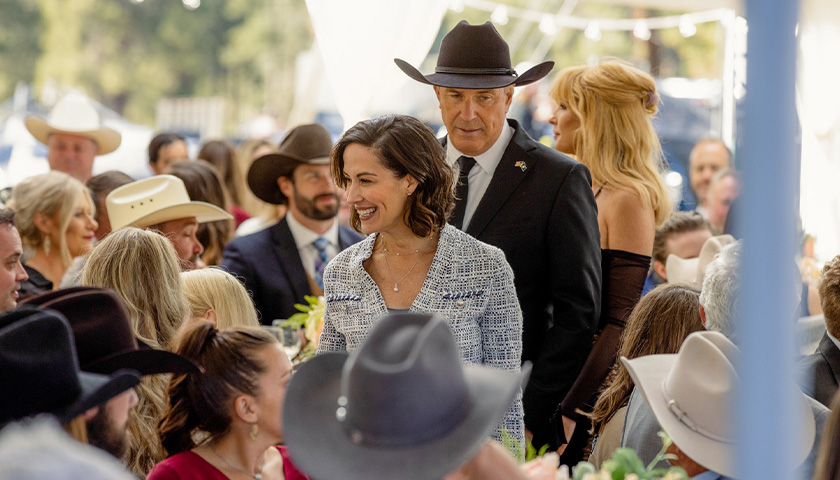by Mackubin Owens
Recently I offered a defense of the television series “Yellowstone” against the charge that it is just another soapy melodrama about a dysfunctional family, nothing more than an updated version of “Dallas” or “Falcon Crest.” Instead, I suggested a deeper meaning: that it appeals to its audience because it portrays a microcosm of America’s ongoing struggle, the defense of “place” against those who would threaten it. But closely associated with this meaning of the series, I believe there is another source of appeal: its treatment of what Harvey Mansfield calls “manliness.”
Manliness
Of course, from the academy to popular culture, the very concept of “manliness” or “masculinity” is under sustained attack. We rarely see or hear the word used without the adjective “toxic.” But, as Mansfield argued in his book on the topic, there are two types of manliness. The negative version, dominant in the academy, holds that men use their inherent aggressiveness only to impose their will on the weak, particularly women.
Mansfield argues on behalf of a positive understanding of manliness, according to which a man uses his mental and physical strength to defend himself and those he loves from any threats. In this version, the fact that men are statistically stronger than women does not bestow on them privileges, but rather imposes responsibilities. In general, the archetype of the virile man in a positive sense is represented by soldiers who go to war and risk their lives to defend their mothers, wives, daughters, and sisters.
The positive version of manliness—its animating ethos—holds that the archetypical attributes of manliness are courage, physical strength, independence, and assertiveness and these have no real purpose aside from defending one’s own as well as the weak and vulnerable. A true man defends his rights, but also recognizes his duties.
I believe that the positive version of manliness that “Yellowstone” seems to praise accounts—at least in part—for its popularity. In my earlier essay, I suggested “Yellowstone” is a tribute to such old-fashioned virtues as honor, courage, and loyalty. For all his foibles, these are what inform John Dutton’s life. There is something stoic about him. His commitment to principle trumps even his economic interests. It is clear that he could become rich by selling his land but, because of a promise he made to his father to keep the land whole, he refuses. As he acknowledges at one point, ‘This is going to be the end of us. But we’re going to do it anyway.’
John Dutton is not the only example of positive manliness in “Yellowstone.” Certainly his foreman, Rip Wheeler, also qualifies: stoic, slow to anger, loyal, a fierce defender of those whom he loves and those who work for him. John Dutton took in Rip when he was a homeless orphan and turned him into a man, inculcating him with Dutton’s own masculine virtues. Rip does the same with some of the young, aimless cowboys in the bunkhouse, as well as the young orphan his wife, Beth Dutton, essentially adopts. His love for, and loyalty to, a frequently over-the-top and self-destructive Beth is praiseworthy.
Rip is in fact closer to John Dutton than either of Dutton’s surviving sons, Kayce or the adopted Jamie. Kayce, a former Navy SEAL, shares many of John’s virtues, especially his loyalty to his Indian wife, Monica and their son, whom he chooses over his father. Poor Jamie oscillates between bullying those he can and cowering before those he can’t. He is most like the male characters in “Succession,” the program to which “Yellowstone” is most often compared, a bully and a toady.
Another example of positive manliness is Thomas Rainwater, the chairman of the Confederated Tribes of the Broken Rock Reservation. Rainwater, as well as his right hand man, Mo, exemplify the stoicism and dignity often attributed to the American Indian. He is prudent, seeking to defend the old ways by using the new tools provided him by the White Man. Like the Crow tribe before him who were driven west from their ancestral lands by the Lakota Sioux, Rainwater makes an alliance of convenience with a white man, John Dutton, to repel the forces that threaten them both.
As C. S. Lewis wrote in The Abolition of Man, “We make men without chests and expect from them virtue and enterprise. We laugh at honor and are shocked to find traitors in our midst.” In light of the modern denigration of masculinity and manliness, it is refreshing to see a positive portrayal of masculine virtues in “Yellowstone.”
“Strong Women” vs. “Toxic Femininity”
“Yellowstone” and its prequels, “1883” and “1923,” have been praised for their portrayal of “strong women.” As in the case of masculinity, perceptions of femininity have changed over time. Feminine virtues traditionally have included sensitivity, patience, vulnerability, resilience, and warmth, but with the expansion of opportunities in all walks of life and the resulting competition between men and women, one wonders if these characteristics have been rendered obsolete. “Yellowstone” suggests that the abandonment of feminine virtues may lead to what can only be called “toxic femininity.”
Exhibit A is Beth Dutton. As one commentator has noted, Beth “is not simply a woman in a man’s world, although that is certainly the fact of her situation; she is also a woman who acts like a man in a man’s world.” Ironically, the behavior she exhibits is akin to Mansfield’s bad form of masculinity. Although her fierce defense of those she loves—her father and her husband, Rip—is praiseworthy (as the saying goes, “In a world of Karens, be a Beth”), she lacks any sense of moderation, which makes her an agent of chaos. She has internalized Lady Macbeth’s plea: “Come, you spirits/That tend on mortal thoughts, unsex me here/And fill me from the crown to the toe topful/Of direst cruelty!”
But Beth is not alone in her toxic femininity. Caroline Warner, the CEO of Market Equities, the firm behind the attempt to build the airport that will threaten the Dutton ranch, is as vicious as Beth, but in the long run, no match for her. There is also Angela Blue Thunder, who seeks to depose Rainwater as chairman of the Confederated Tribes. Finally, there is Sarah Atwood, Warner’s successor as CEO. She is as much a predatory corporate shark as her predecessor but more subtle, preferring to exploit Jamie Dutton’s weaknesses by seducing him. As of the halfway mark of season five, her inevitable clash with Beth—which will no doubt resemble the competition between Hera and Aphrodite—lies in the future.
Of course, there are other female characters in “Yellowstone” who adhere more closely to the traditional understanding of feminine virtues while also exhibiting strength and resilience, e.g. Monica, Kayce’s Indian wife; and Lynelle Perry, John’s predecessor as governor and now U.S. senator (and Dutton’s sometime love interest). But for examples of truly strong women who do not abandon their feminine qualities, it is best to see the prequels, especially Cara (Helen Mirren) in “1923.”
Perhaps I have made too much out of this. But it seems clear that “Yellowstone” is a cultural phenomenon that may cause us to reflect on the American story.
– – –
Mackubin Thomas Owens is a retired Marine, professor, and editor who lives in Newport, RI.
Photo “Yellowstone” by Yellowstone.





